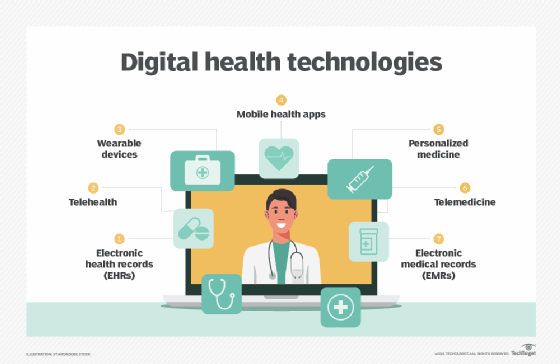What is athenahealth Inc.?
Athenahealth, Inc. provides cloud-based electronic health record (EHR) systems, revenue cycle management (RCM), patient engagement tools and point-of-care mobile applications. The company primarily serves small to medium-sized physician practices and hospitals, offering integrated solutions that support clinical, financial and operational workflows across the healthcare continuum.
With approximately 5,000 employees across six U.S. locations and three offices in India, athenahealth reports that its platform is used by nearly 115,000 healthcare providers. The company is consistently ranked among the top vendors for ambulatory EHR solutions, competing with eClinicalWorks, Greenway Health, NextGen, and others.
History of athenahealth
Athenahealth was founded in 1997 by Jonathan Bush and Todd Park, both former consultants for Booz Allen Hamilton. The idea for the company emerged after those co-founders purchased a birthing center in San Diego and became frustrated with inefficient, paper-based systems. Headquartered in Watertown, Mass., athenahealth began as a revenue cycle management company before launching its first cloud-based EHR platform.
Over the years, athenahealth expanded its capabilities through organic growth and acquisitions. Notable milestones include:
- 2015: Acquired RazorInsights, an EHR vendor for rural and community hospitals, to enter the inpatient market.
- 2015: Partnered with Beth Israel Deaconess Medical Center (BIDMC) and CIO John Halamka to adapt BIDMC's homegrown EHR system for small hospitals.
- 2018–2019: Acquired by Veritas Capital and Evergreen Coast Capital. It later merged with Virence Health (GE Healthcare's former value-based care business) to create a unified healthcare technology company under the athenahealth brand.
Bush, a vocal health IT entrepreneur and cousin of former U.S. President George W. Bush, served as the company's CEO until stepping down in 2018 amid a leadership transition.
Athenahealth products and services
Athenahealth offers an integrated, cloud-based suite known as athenaOne, which combines multiple capabilities into a single platform:
- athenaClinicals. An EHR system designed for ambulatory care settings. It integrates clinical workflows, documentation, order entry and population health tools. The system includes Epocrates, a popular clinical decision support and drug reference mobile app.
- athenaCollector. A practice management and RCM solution that streamlines billing, coding, claims management and payment processing.
- athenaCommunicator. A suite of patient engagement tools that includes secure messaging, appointment reminders, self-scheduling, live operator-access, and patient portal access.
- athenaCoordinator. Facilitates care coordination and order transmission between providers, helping reduce administrative overhead.
- athenaPopulation Health. Offers population health analytics, quality management, and care gap tracking. It supports value-based care initiatives and regulatory reporting.
- athenaOne Analytics. A real-time dashboard tool that helps healthcare organizations monitor operational, clinical and financial performance.

AetnaHealth recent innovations
Athenahealth continues to expand its ecosystem through strategic programs and product innovations:
- athenahealth Marketplace: An app store featuring third-party solutions that integrate with athenahealth, including tools for telehealth, chronic care management, patient surveys, and clinical screeners.
- More Disruption Please (MDP): An accelerator program supporting health tech startups and innovators. MDP offers mentorship, funding opportunities and access to athenahealth's network of customers. Through MDP, athenahealth acquired Arsenal Health, a smart scheduling software startup.
These initiatives are intended to help foster innovation, extend the functionality of athenahealth products, and drive interoperability across healthcare systems.
In August, 2025, athenahealth announced several enhancements based on artificial intelligence. Those AI features include: leveraging AI to label clinical, imaging and administrative documents as they are saved to a chart; and the pilot of a new feature: the Model Context Protocol (MCP). The MCP server, available on athenaOne platform APIs, enables standardized communication between AI models and the athenaOne platform, according to the company.
Athenahealth competitive landscape
Athenahealth operates in a highly competitive health IT market. Key rivals include:
- Epic Systems and Oracle Cerner in the inpatient and enterprise EHR space
- eClinicalWorks, NextGen Healthcare, Greenway Health, and Kareo in the ambulatory EHR and RCM sectors
Athenahealth differentiates itself with its cloud-native architecture, network-enabled workflows, and centralized services model, which includes billing and payer outreach services managed on behalf of customers.
Athenahealth's focus on interoperability
Interoperability is a core focus for athenahealth. The company supports FHIR (Fast Healthcare Interoperability Resources) APIs, and participates in national data-sharing initiatives like CommonWell Health Alliance and Carequality.
Athenahealth promotes open access to clinical data through:
- API developer tools for third-party integrations.
- What it terms seamless data exchange with external EHRs.
- Integrated clinical messaging to enhance provider collaboration.
By fostering interoperability, athenahealth aims to reduce information silos, support better care coordination, and improve outcomes across its network.
Athenahealth under private equity ownership
Since being taken private in 2019, athenahealth has operated under the joint ownership of Veritas Capital and Evergreen Coast Capital. This transition has allowed for increased investment in platform modernization and R&D without the short-term pressure of public markets, according to the company.
Under private equity ownership, the company has focused on:
- Enhancing cloud infrastructure and user experience
- Expanding its API ecosystem and third-party partnerships
- Driving adoption of value-based care technologies
These strategic shifts have positioned athenahealth for sustained growth in the competitive ambulatory and midsize hospital EHR markets.
IoT is likely to play a significant role in the future of digital health. However, healthcare IoT comes with several cybersecurity risks that endanger patient data. Learn the risks of healthcare IoT and how to mitigate them. Explore why hybrid care is healthcare's future.




